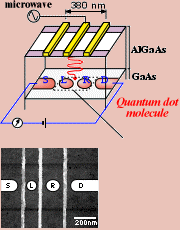Quantum dot molecule
Quantum dots are small conductive regions in a semiconductor, containing a variable number of electrons that occupy well-defined quantum states. Quantum dots are often referred to as 'artificial atoms' and provide useful models for studying the behavior of electrons in atoms. Two quantum dots can be connected to form an 'artificial molecule': the strength of the electronic tunneling between the atoms determines whether the 'bonding' is 'ionic' (in which electrons are localized on individual dots) or 'covalent' (in which the electrons are delocalized over both dots). We have seen a transition from ionic to covalent bonding in an artificial molecule that is probed by microwave excitations.[Ref] Quantum-dot molecule as single-electron device displays controllable quantum coherence, which is a requirement for quantum logic circuitry.
=> Quantum Solid State Physics Research Group











